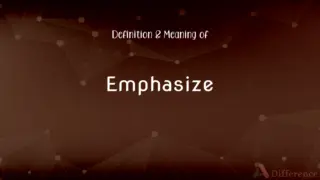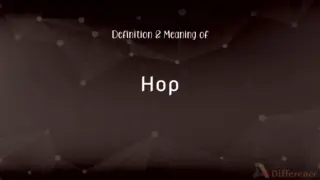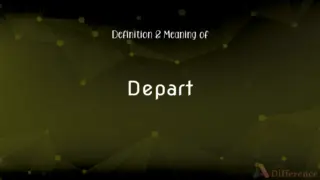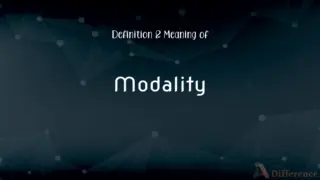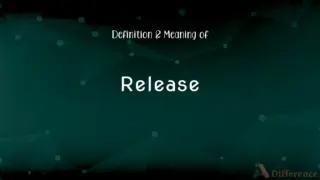Demise Definition and Meaning
Edited by Tayyaba Rehman — By Fiza Rafique — Published on April 25, 2024
Demise means the death of a person or the end of something's existence or operation. e.g., The king's demise led to a power struggle within the kingdom.
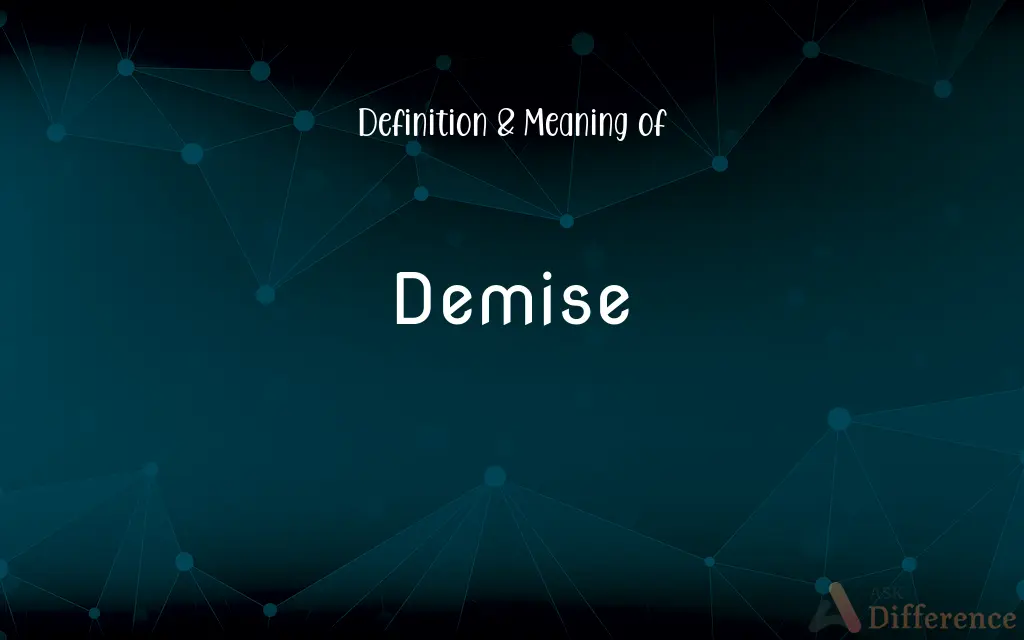
Table of Contents
Demise Definitions
The end of life.
The news of the novelist's demise shocked the literary world.
The end of a species' existence.
Overhunting led to the dodo bird's demise.
The end of a particular condition.
The treaty signaled the demise of hostilities between the two nations.
The conveyance or transfer of an estate.
His will detailed the demise of his property to his children.
The end of something's operation or existence.
The company's demise was due to poor financial management.
The collapse or failure of a project or business.
The new product's failure led to the company's demise.
The loss of status or power.
The scandal led to the politician's demise.
The end of a relationship or partnership.
Disagreements over finances led to the band's demise.
When a system or machine stops working.
The old clock's demise came after years of neglect.
Death.
The end of existence or activity; termination
The demise of the streetcar.
(Law) Transfer of an estate by lease or will.
The transfer of a ruler's authority by death or abdication.
(Law) To transfer (an estate) by will or lease.
To transfer (sovereignty) by abdication or will.
(Law) To be transferred by will or descent
The land demised to a charitable institution.
To die.
(legal) The conveyance or transfer of an estate, either in fee for life or for years, most commonly the latter.
Transmission by formal act or conveyance to an heir or successor; transference; especially, the transfer or transmission of the crown or royal authority to a successor.
(countable) Death.
(countable) The end of something, in a negative sense; downfall.
The lack of funding ultimately led to the project's demise.
To give.
To convey, as by will or lease.
To transmit by inheritance.
To pass by inheritance.
(intransitive) To die.
Transmission by formal act or conveyance to an heir or successor; transference; especially, the transfer or transmission of the crown or royal authority to a successor.
The decease of a royal or princely person; hence, also, the death of any illustrious person.
After the demise of the Queen [of George II.], in 1737, they [drawing- rooms] were held but twice a week.
The conveyance or transfer of an estate, either in fee for life or for years, most commonly the latter.
To transfer or transmit by succession or inheritance; to grant or bestow by will; to bequeath.
What honorCanst thou demise to any child of mine?
To convey; to give.
His soul is at his conception demised to him.
To convey, as an estate, by lease; to lease.
The time when something ends;
It was the death of all his plans
A dying of old hopes
The conclusion of a specific time or era.
The dinosaur's demise marked the end of an era in Earth's history.
Demise Snonyms
Downfall
A decline to a lower condition or status.
Mismanagement was the main cause of the empire's downfall.
End
The final part of something.
The end of the war brought relief to many.
Expiration
Coming to an end or ceasing to be valid.
The expiration of the lease left them looking for a new apartment.
Cessation
The process of ending or being brought to an end.
The cessation of hostilities was welcomed by all sides.
Extinction
The state of ceasing to exist.
The extinction of numerous plant species is a growing concern.
Collapse
A sudden failure or breakdown.
The bridge's collapse was due to years of neglect.
Death
The end of life.
The poet's death marked the end of an influential career.
Dissolution
The process of dissolving or ending.
The dissolution of their partnership was mutual and amicable.
Passing
The end of life; death.
The community mourned the passing of their beloved leader.
Decline
A gradual worsening or decrease in quality or quantity.
The decline of the industry was due to technological advancements.
Demise Idioms & Phrases
Lead to one's demise
To cause or result in death or ending.
His reckless actions led to his own demise.
The demise of something
The end or death of something.
The documentary detailed the demise of the ancient civilization.
Mark the demise
To indicate the end of something.
The fall of the Berlin Wall marked the demise of the Cold War era.
On the brink of demise
Very close to ending or failing.
The species is on the brink of demise due to habitat destruction.
Seal one's demise
To ensure the end or failure of something.
The last defeat sealed the team's demise in the championship.
Bring about the demise
To cause something to end.
Poor leadership brought about the company's demise.
Accelerate the demise
To speed up the ending of something.
Technological changes accelerated the demise of traditional industries.
Spell the demise
To indicate or predict the ending of something.
The new regulations could spell the demise of small businesses.
Witness the demise
To see or experience the end of something.
He witnessed the demise of the empire he once served.
Meet one's demise
To die or come to an end.
The old regime met its demise after the revolution.
In the wake of the demise
Following the end or death of something.
In the wake of the demise of the dictator, the country faced uncertainty.
Hasten the demise
To make something end sooner.
The scandal hastened the CEO's demise.
Lament the demise
To express grief or regret for the end.
Historians lament the demise of ancient libraries.
Mourn the demise
To feel sorrow for the end or death.
Fans across the world mourned the demise of the iconic singer.
Anticipate the demise
To expect the end.
Analysts anticipate the demise of the current economic boom.
Contribute to the demise
To play a part in ending something.
Miscommunication contributed to the project's demise.
Avert the demise
To prevent the end or failure.
Swift action averted the demise of the endangered species.
Survive the demise
To continue existing after something has ended.
The language survived the demise of its original speakers.
The twilight of one's demise
The period leading up to the end.
In the twilight of his demise, the artist produced his finest work.
Signal the demise
To indicate the coming end.
The changing climate signals the demise of many ecosystems.
Demise Example Sentences
The demise of the empire was hastened by internal strife.
Many feared the new policy would lead to the park's demise.
The scientist's demise was a great loss to the community.
The demise of the old theater saddened the town's residents.
News of the political leader's demise spread quickly.
The species faced imminent demise without intervention.
The festival's demise came after years of declining attendance.
After the founder's demise, the company struggled to find direction.
She worked hard to prevent her family business's demise.
The project faced its demise due to lack of funding.
He did not live to see his invention's widespread success, passing away a year before its demise.
The author's last book was published posthumously, after his demise.
Rumors about the celebrity's demise were greatly exaggerated.
Environmental changes threaten the demise of many coral reefs.
The demolition of the historic building marked the demise of an era.
Common Curiosities
What is the verb form of demise?
The verb form related to "demise" is "demise" itself, used in legal contexts, but commonly "to die" or "to end" are used in relation to death or ending.
What is the root word of demise?
The root word of "demise" is the Latin "demittere," meaning to send down or let fall.
How many syllables are in demise?
There are two syllables in "demise."
What is a stressed syllable in demise?
The stressed syllable in "demise" is the second one: -mise.
How do we divide demise into syllables?
Demise is divided into syllables as de-mise.
How is demise used in a sentence?
e.g., The historic building's demise was inevitable after the city approved the new development plan.
What part of speech is demise?
"Demise" is primarily a noun.
What is the pronunciation of demise?
Demise is pronounced as /dɪˈmaɪz/.
Why is it called demise?
It is called "demise" from the Middle French "démettre" meaning to dismiss or put away, ultimately from the Latin "demittere," signifying the end or fall of something or someone.
What is the opposite of demise?
The opposite of "demise" could be "birth," "beginning," or "inception."
Is demise a noun or adjective?
"Demise" is a noun.
Is demise a vowel or consonant?
The word "demise" starts with a consonant.
Is demise a countable noun?
Yes, "demise" is a countable noun. You can have multiple demises.
Is demise an adverb?
No, "demise" is not an adverb.
Which determiner is used with demise?
Determiners such as "the," "a," or possessive pronouns can be used with "demise" depending on the context, e.g., "the demise," "his demise."
Which conjunction is used with demise?
Conjunctions are not specifically used with "demise" but depend on the sentence structure, e.g., "and" in "his demise and its consequences."
Which article is used with demise?
The definite article "the" is commonly used with "demise," as in "the demise of the empire."
What is another term for demise?
Another term for "demise" is "death" or "end."
What is the singular form of demise?
"Demise" itself is the singular form.
Is demise a negative or positive word?
"Demise" generally has a negative connotation, as it refers to death or the end of something.
Is demise a collective noun?
No, "demise" is not a collective noun.
Which vowel is used before demise?
The vowel or article used before "demise" depends on the context; "the" is commonly used, as in "the demise."
What is the plural form of demise?
The plural form of "demise" is "demises."
Is demise an abstract noun?
Yes, "demise" is an abstract noun as it refers to an idea or concept rather than a physical object.
Is the demise term a metaphor?
"Demise" can be used metaphorically to refer to the end or downfall of something, not just death.
Is the word demise imperative?
No, "demise" is not typically used in an imperative form as it is a noun.
Is the word demise Gerund?
No, "demise" is not a gerund. It remains a noun in its usage.
Is the word “demise” a Direct object or an Indirect object?
"Demise" can serve as a direct object in a sentence, e.g., "They mourned the demise of their leader."
Which preposition is used with demise?
Prepositions such as "of" (the demise of something) or "after" (after the demise) are commonly used with "demise."
Share Your Discovery
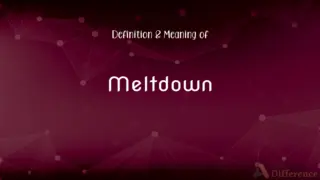
Previous Term
Meltdown Definition and Meaning
Next Term
Objective Definition and MeaningAuthor Spotlight
Written by
Fiza RafiqueFiza Rafique is a skilled content writer at AskDifference.com, where she meticulously refines and enhances written pieces. Drawing from her vast editorial expertise, Fiza ensures clarity, accuracy, and precision in every article. Passionate about language, she continually seeks to elevate the quality of content for readers worldwide.
Edited by
Tayyaba RehmanTayyaba Rehman is a distinguished writer, currently serving as a primary contributor to askdifference.com. As a researcher in semantics and etymology, Tayyaba's passion for the complexity of languages and their distinctions has found a perfect home on the platform. Tayyaba delves into the intricacies of language, distinguishing between commonly confused words and phrases, thereby providing clarity for readers worldwide.







